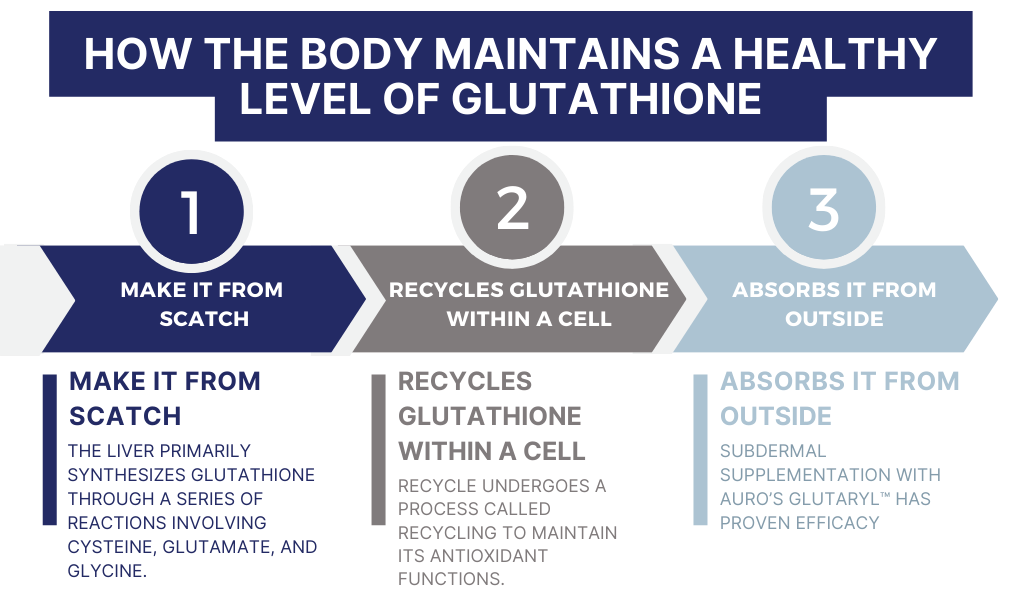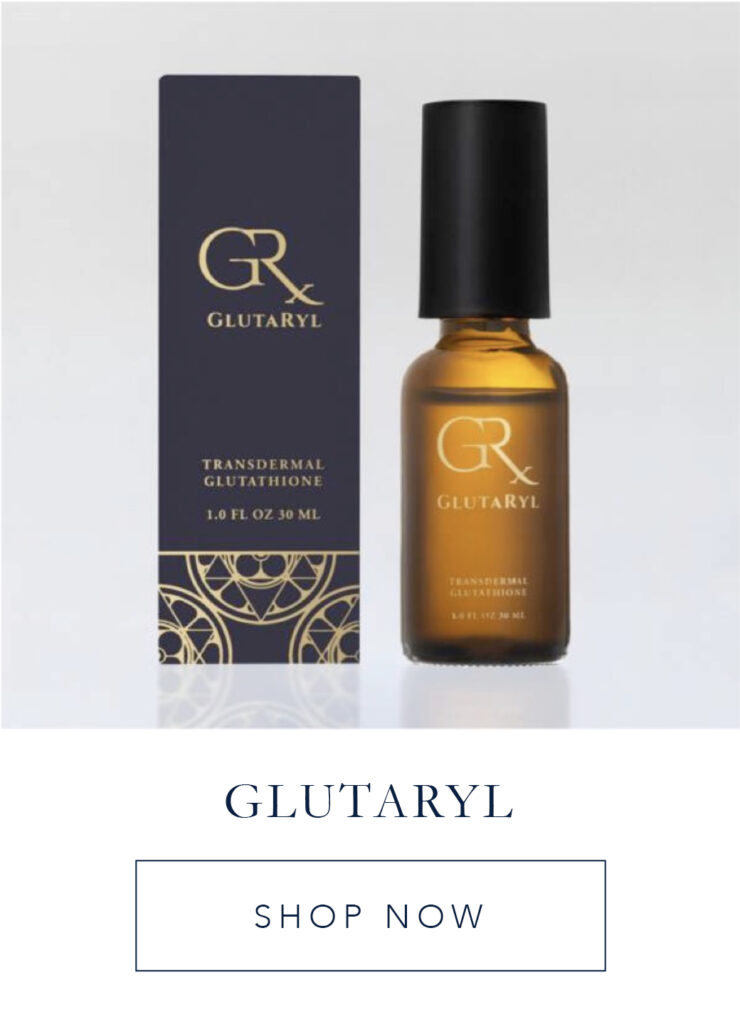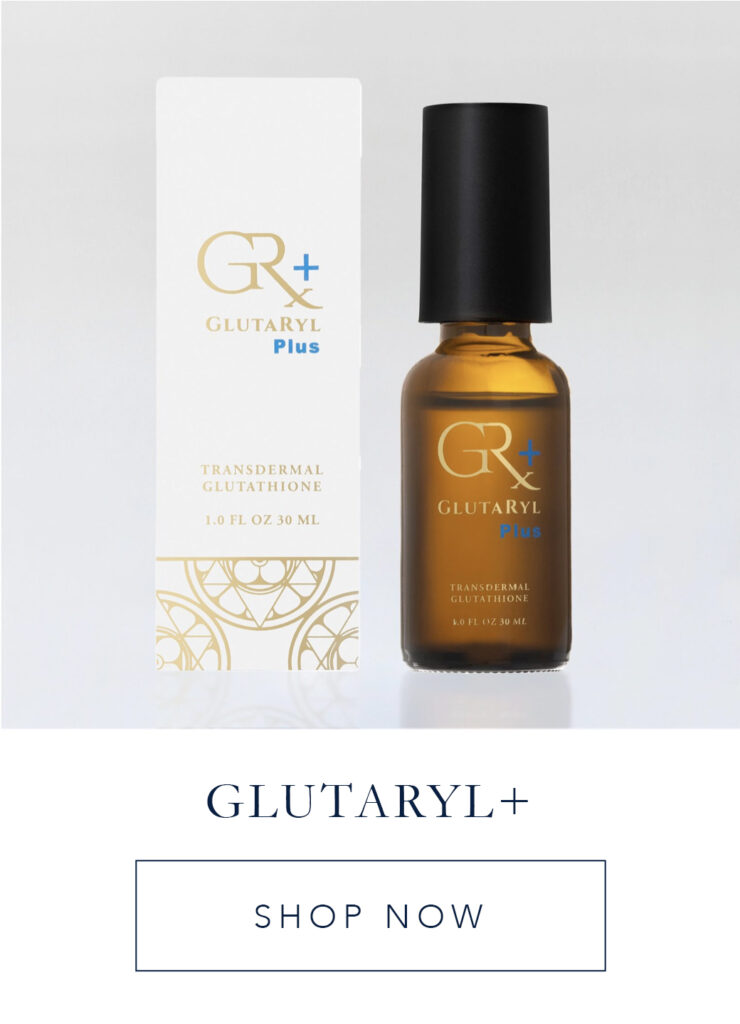Glutathione and Cognitive Function: Protecting Brain Health and Preventing Cognitive Decline
As we age, concerns about cognitive decline become more prevalent. By midlife, we’ve all experienced simple forgetfulness, like walking into a room and forgetting what we are looking for – or struggling with names. Studies show that while there may be a little cognitive decline in the first half of life, it generally begins around age 50 and is most pronounced at age 70 and on. So the question is – why do some people have greater, earlier, and faster cognitive decline than others? Many cumulative factors are at play – from genetics to lifestyle choices. Recent research highlights a promising link between cognitive decline and Glutathione, the body’s natural antioxidant. Reduced levels of Glutathione in the brains of individuals with neurological conditions associated with cognitive decline suggest this potential connection. Glutathione, often called the Master Antioxidant, protects cells from damage and supports brain health by neutralizing free radicals and balancing oxidative stress.
Cognitive Decline: The Signs
As we grow older, changes in the brain and memory become natural occurrences. However, the degree of decline varies from person to person. While some may experience typical age-related changes, others may encounter more severe cognitive disorders that accelerate decline earlier than expected.
While cognitive decline is often associated with aging, it’s essential to distinguish between regular age-related changes and more serious cognitive disorders. Aging cognitive decline includes gradual changes in remembering, reasoning, learning ability, paying attention, judging, and even perceiving the world around you. Mild cognitive impairment (MCI) is a condition characterized by noticeable cognitive decline more significant than expected for an individual’s age but does not interfere significantly with daily functioning. A mild gradual cognitive decline is expected when we age, but considerable change may mean something else is happening with the brain.
The Causes of Cognitive Decline
There are numerous reasons beyond natural aging. Genes and family history play a large role – potentially 60% to 70% of cognitive decline.
Other reasons for cognitive decline include medical conditions from chronic illnesses like diabetes, hypertension, and heart disease. Stroke can contribute to cognitive decline by affecting blood flow to the brain or causing damage to brain cells.
In addition, lifestyle and environmental factors can affect the brain. Unhealthy lifestyle choices that include poor nutrition, lack of exercise, smoking, excessive alcohol consumption, and chronic stress can accelerate cognitive decline. Environmental factors can also damage brain cells and contribute. This includes exposure to toxins, pollutants, or certain chemicals.
These pollutants and lifestyle factors generate free radicals within the body. When these free radicals outnumber the body’s natural regulatory mechanisms, they lead to oxidative stress. Consequently, oxidative stress can cause detrimental changes to lipids, proteins, and DNA, contributing to various human diseases – and cognitive decline.
Oxidative Stress, the Brain, and Glutathione Protection
Oxidative stress arises from an imbalance between free radicals and antioxidants within the body. This stress can harm cells, exacerbating neurodegenerative diseases and underlying many cognitive issues. Studies highlight the crucial role of oxidative stress in the development of conditions, as it alters cellular structure and impairs cellular function.
Other studies take this connection of oxidative stress’s detrimental effect on the brain a step further -indicating a potential connection between Alzheimer’s disease and reduced levels of Glutathione, a protective substance naturally produced by the body. Research suggests that individuals with these diseases often have lower levels of the natural antioxidant Glutathione in their brains. The lack of adequate Glutathione levels allows free radicals to harm the body, leading to oxidative stress, accelerating the aging process, and causing cognitive decline. Glutathione in the Brain states, “GSH depletion in the brain is a common finding in patients with neurodegenerative diseases, such as Alzheimer’s disease and Parkinson’s disease, and can cause neurodegeneration prior to disease onset.” The brain, which consumes high oxygen, is particularly vulnerable to oxidative stress caused by reactive oxygen species (ROS), against which Glutathione actively defends. Reactive oxygen species, or ROS, are a subset of free radicals that contain oxygen. They are naturally produced in the body when cells are metabolized.
Because the brain consumes a large amount of oxygen and is rich in unsaturated fatty acids, it is particularly vulnerable to oxidative damage. As a study stated, “The cells of the adult human brain consume approximately 20% of the oxygen utilized by the body although the brain comprises only 2% of the body weight.” With this high oxygen consumption, the brain is extremely susceptible to ROS, which antioxidants like Glutathione must balance to prevent cell damage.
Increasing Glutathione for Brain Health
The powerful link between Glutathione’s role in helping manage cognitive decline and brain health and aging is promising. Cells maintain a healthy level of Glutathione by making it from scratch when needed, recycling it within the cell, and absorbing it from the outside. Lifestyle choices can impact healthy Glutathione levels, including a diet rich in Glutathione-boosting foods. Avoiding toxins, moderate exercise, and managing sleep and stress are also factors in plentiful Glutathione levels.
Another way to increase Glutathione when the body is depleted of this Master Antioxidant is supplementation. But not all supplements are alike. The delivery method of the Glutathione is critical – and Auro’s Glutaryl is a subdermal supplement that has shown its efficacy in a pilot study that determined the topical application of Glutaryl positively affects the immune system, reduces harmful substances, and helps fight against the mycobacterium infection. What makes Glutaryl different than other supplements is the Auro GSH™ Antioxidant Delivery System, a patented, first-of-its-kind technology that optimizes antioxidant absorption. The spray utilizes a transdermal (through the skin) system discovered and developed by pharmacist and Auro founder Dr. Nayan Patel. Powered by sub-nano technology, it delivers Glutathione more potently than ever with just four sprays twice daily.
We can take action against cognitive decline and harness the power of Glutathione to protect the brain against damage. Consider supplementation with Glutaryl to enhance Glutathione levels—a powerful tool for taking control of your brain health.







